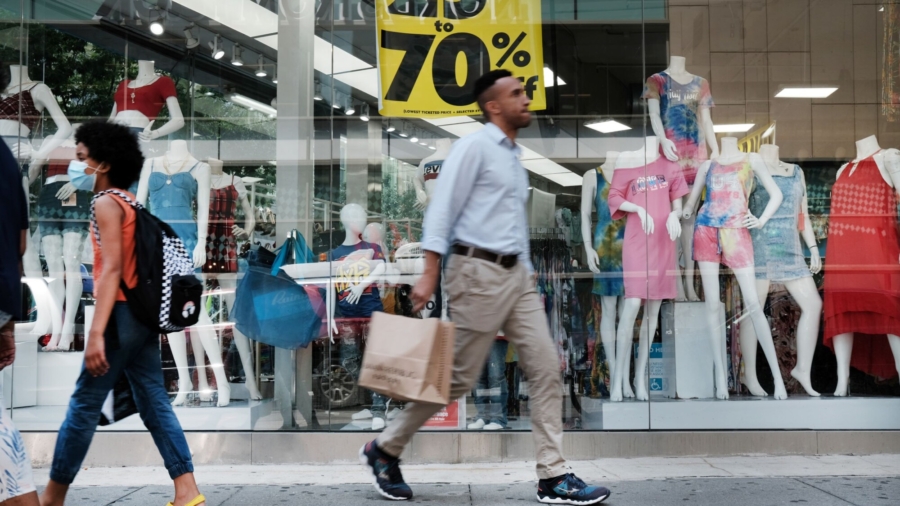Americans spent at a brisk pace in August, defying economists’ expectations for a contraction in U.S. retail sales, though much of the spending was online as the spread of the Delta variant may have kept people from heading out to shop in greater numbers.
Retail and food services sales rose 0.7 percent in August after falling by 1.8 percent in July, according to an advance estimate from the Census Bureau (pdf). Consensus forecasts cited by FXStreet predicted a 0.8 percent drop in the retail sales number.
“Retail sales have more or less been treading water since March. Still, this month-over-month plateau represents a big jump from last year. August 2021 sales, for instance, were up 15.1 percent from August 2020,” said Bankrate senior industry analyst Ted Rossman, in an emailed statement to The Epoch Times.
“Consumers have continued to spend robustly even after the stimulus sugar-high has worn off. That’s a good sign for the economy,” Rossman added.
Online sales surged 5.3 percent in August, after falling by 4.6 percent last month, the report showed. Spending at general merchandise stores vaulted 3.5 percent, department store sales advanced 2.4 percent, and spending at home furnishing stores rose 3.7 percent.

The biggest drag on the headline number came from motor vehicle and parts sales, which fell 3.6 percent in August, while spending at electronic and appliance stores fell 3.1 percent.
“Supply chain disruptions continue to plague these and other industries,” Rossman said. “Still, I’m optimistic about the upcoming holiday season. Even if retail sales figures continue to trend sideways, that would represent roughly a 15 percent gain over 2020 levels,” he added.
Restaurants and bars are the only services category included in the retail sales report, which showed that spending at food services and drinking places stayed flat over the month in August, after climbing 1.3 percent in July, possibly reflecting greater consumer caution amid reports of rising COVID-19 infections.
COVID-19 is the disease caused by the CCP (Chinese Communist Party) virus, also known as SARS-CoV-2 or the novel coronavirus.
Consumer spending, which is a key driver of the economy, notched double-digit growth in the second quarter, helping to pull the level of GDP above its pre-pandemic peak. With households sitting on an estimated $2.5 trillion in excess savings accumulated during the pandemic, consumer spending is likely to remain strong as attention starts to turn to the all-important Christmas shopping season.
“Many people are getting an early start on their Christmas shopping, according to a recent survey from our sister site CreditCards.com, and I expect many retailers will begin their holiday sales by early November, fueling the buzz around what should be a long holiday sales period,” Rossman said.
From The Epoch Times


